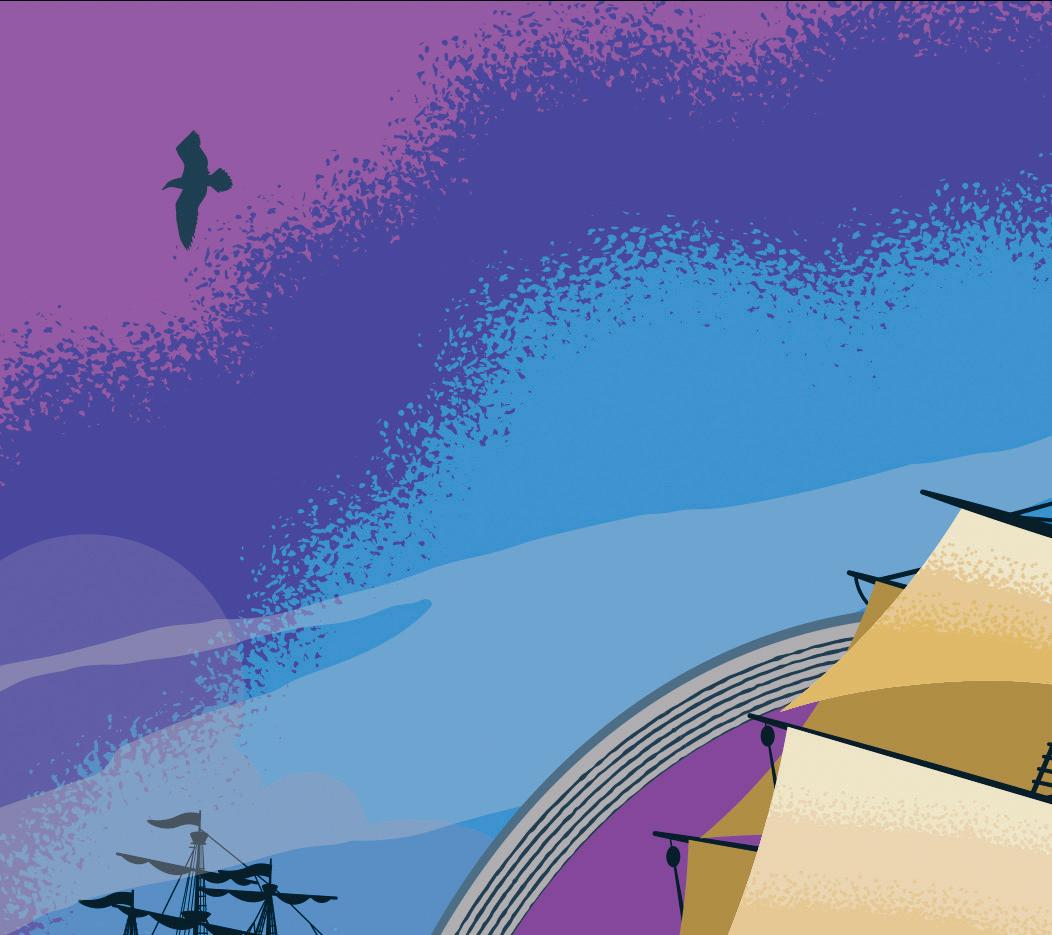
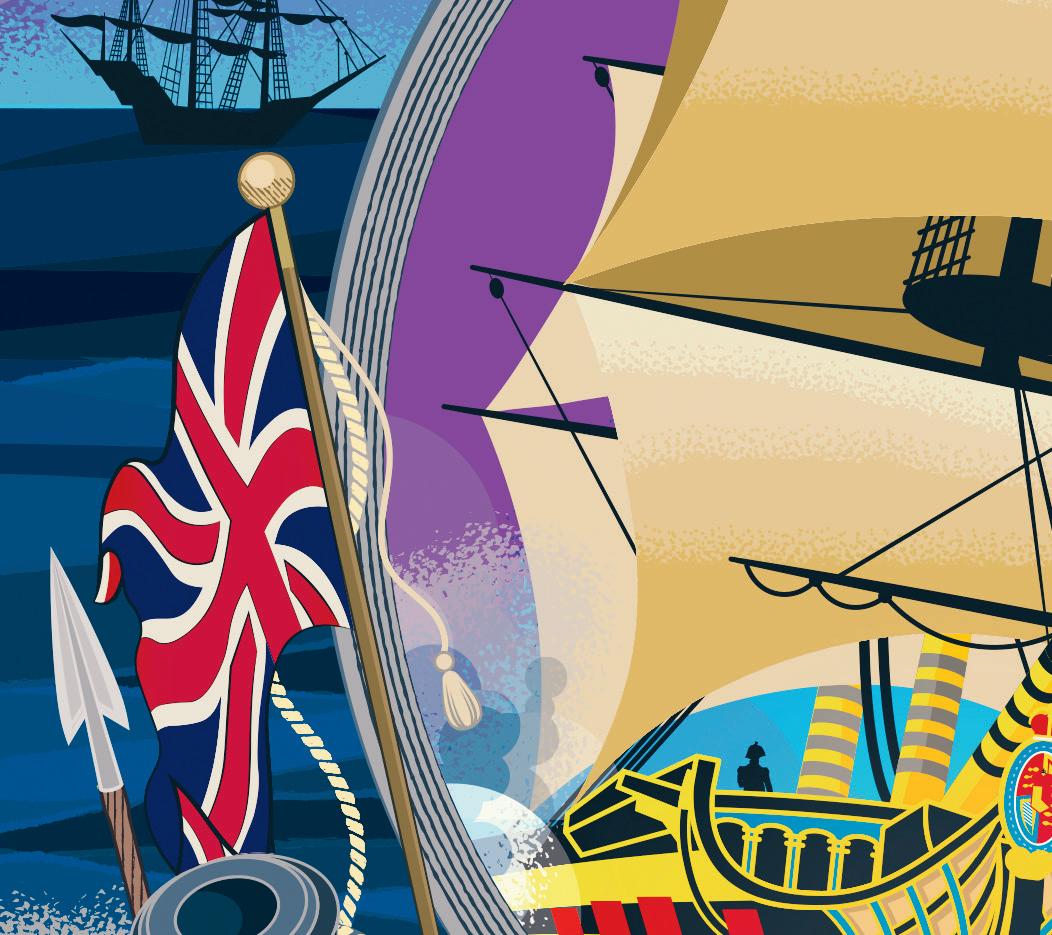
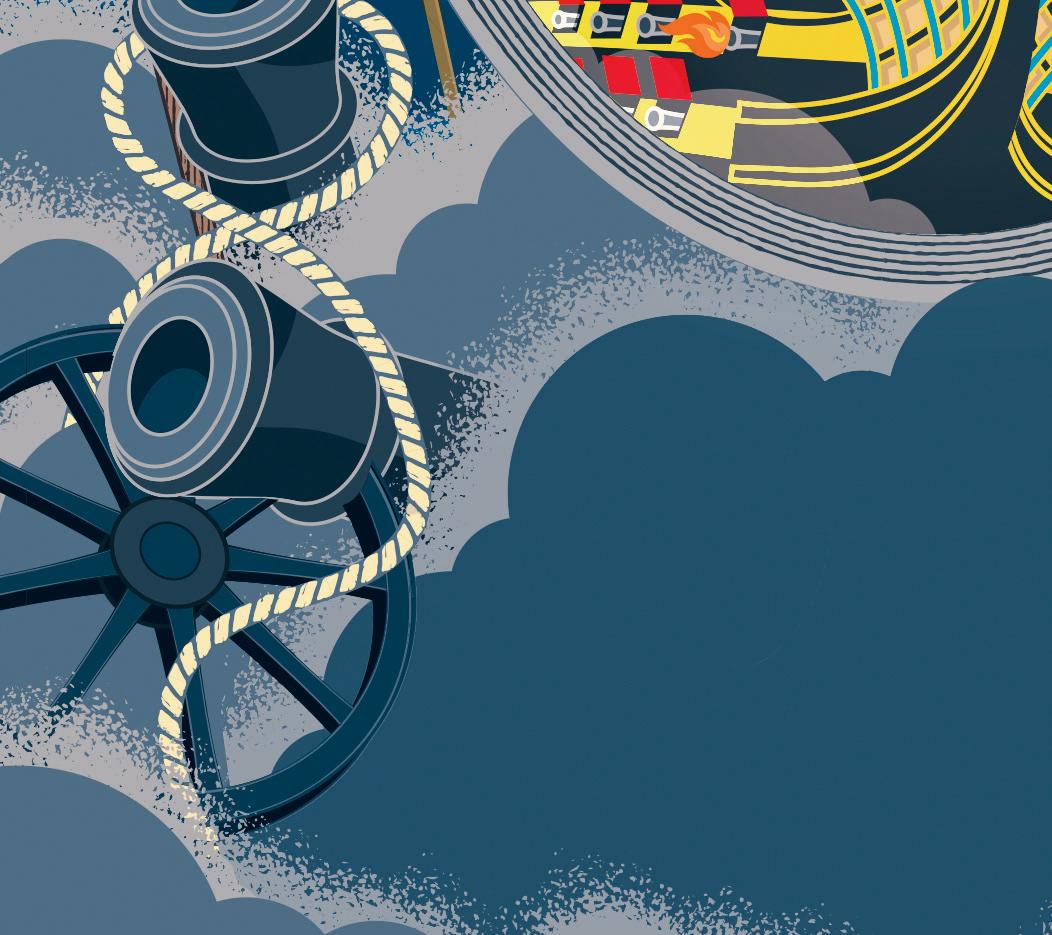

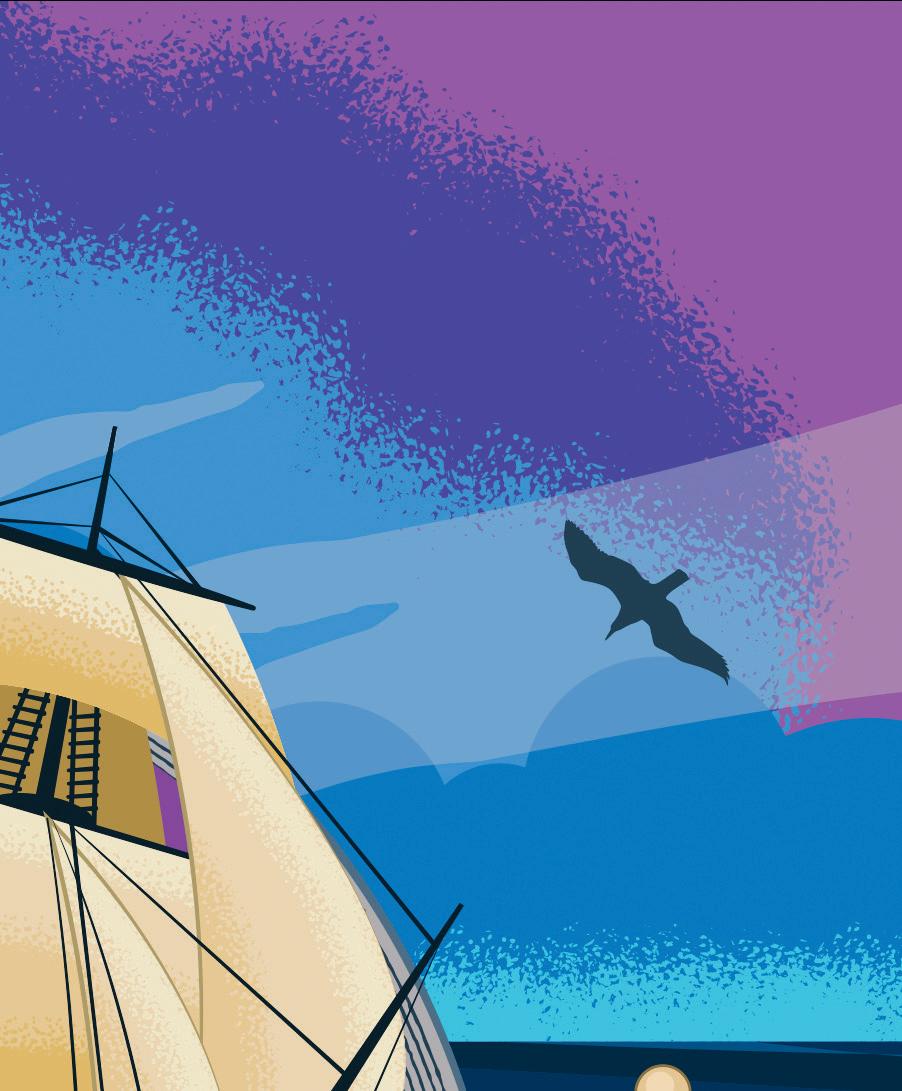
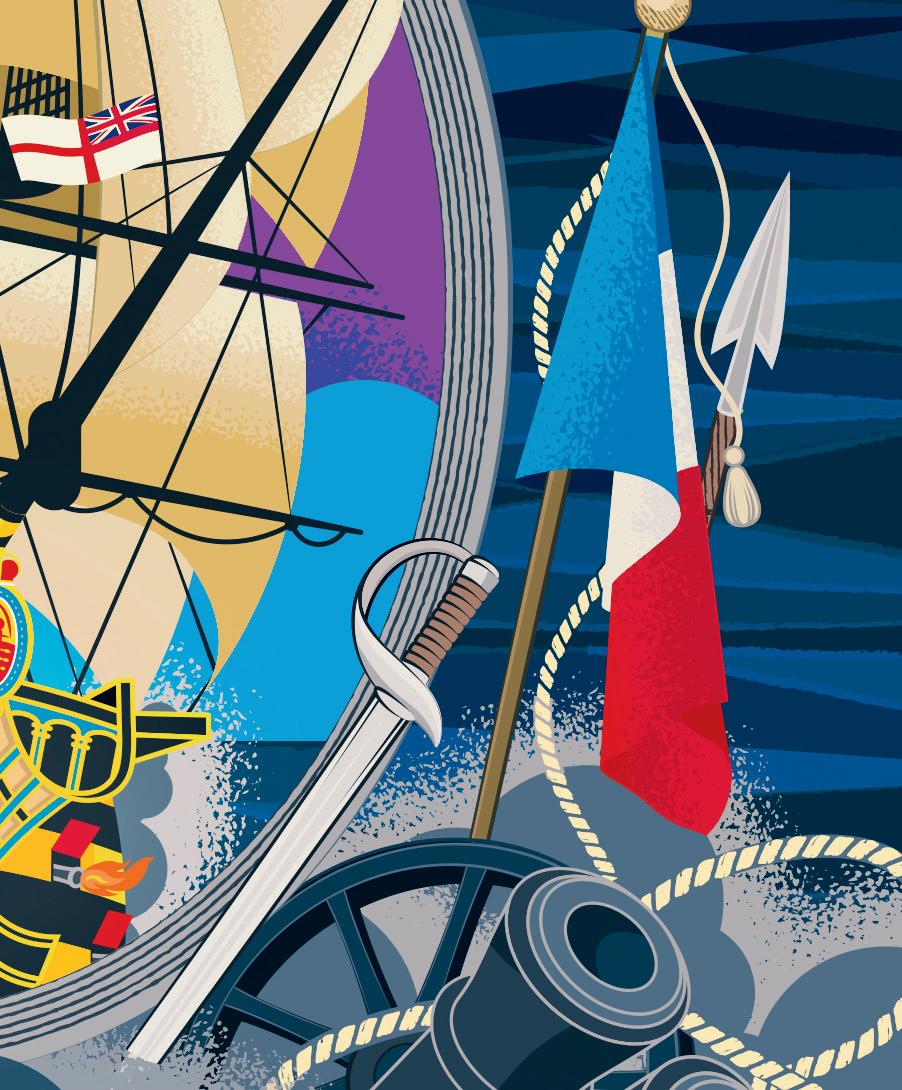

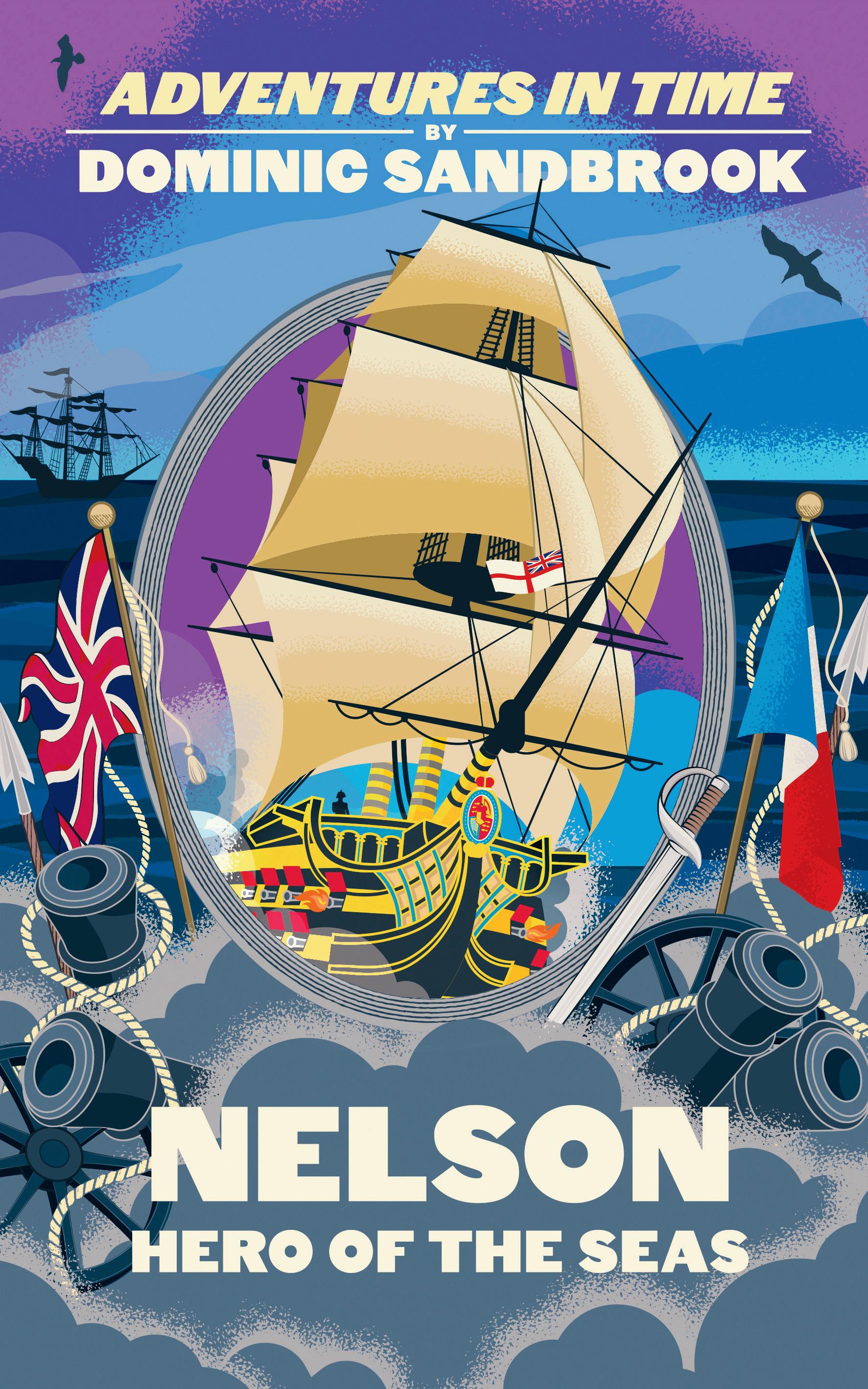









The Second World War
The Six Wives of Henry VIII
The First World War
Alexander the Great Cleopatra, Queen of the Nile
Fury of the Vikings
The Fall of the Aztecs
Nelson, Hero of the Seas
With illustrations by Edward
Bettison
an imprint of
UK | USA | Canada | Ireland | Australia
India | New Zealand | South Africa
Particular Books is part of the Penguin Random House group of companies whose addresses can be found at global.penguinrandomhouse.com
First published in Particular Books 2024 001
Text copyright © Dominic Sandbrook, 2024 Illustrations copyright © Edward Bettison, 2024
The moral right of the author has been asserted
Set in 12.51/16.56pt Bembo Book MT Std Typeset by Jouve (UK), Milton Keynes Printed and bound in Great Britain by Clays Ltd, Elcograf S.p.A.
The authorized representative in the EEA is Penguin Random House Ireland, Morrison Chambers, 32 Nassau Street, Dublin d 02 yh 68
A CIP catalogue record for this book is available from the British Library isbn : 978–0–241–55221–6 www.greenpenguin.co.uk
Penguin Random Hous e is committed to a sustainable future for our business , our readers and our planet. is book is made from Forest Stewardship Council® certified paper
For Ben Fallows, Charlie Voyce, Raphael Rayner, Oakley Webb and Arthur Heathcoat-Amory
It was extremely cold, and I wished him to put on a greatcoat of mine which was in the boat:
‘No, I am not cold, my anxiety for my country will keep me warm.’
The master of HMS Bellona, remembering an exchange with Nelson, 19 April 1801
It was a warm, sunny morning in the autumn of 1805. O the southern tip of Spain, a British fleet was sailing towards one of the greatest battles in history.
The lookouts had spotted their quarry at dawn: a forest of masts on the eastern horizon. The drummers had beaten to quarters, summoning their comrades to their action stations.
The decks had been cleared, the cannons made ready. The gun crews had been issued with powder, cartridges and shot; the surgeon had prepared his scissors and saws.
The o cers had written farewell notes to their wives and children. The sailors had said their last prayers. Now the pipers were playing their patriotic anthems, rousing their friends before the great confrontation.
Onwards they sailed, slowly, deliberately, beneath the Spanish sun.
In the distance, the enemy fleet came steadily closer. Thirty-three warships, the pride of the French and Spanish navies, bristling with more than two thousand guns.
With a single broadside, an enemy ship could blast dozens of men into oblivion, reduce masts to splinters and litter the deck with broken bodies. Yet not for a moment did the British captains waver.
On they came, drums beating, sails filling with the breeze. Their vast flags flew proudly above, some red and white, others red, white and blue. And all the time the sailors were singing.
On the quarterdeck of his flagship, the Victory, a small, slender figure gazed out at the horizon.
The admiral wore a smart blue coat with goldembroidered decorations, and a dark cocked hat. He had only one arm, and if you had looked closely, you might have noticed that his right eye was dull and sightless.
All his life he had waited for this moment. Growing up in a sleepy village at the edge of England, he had always loved stories of the sea.
He had joined the Royal Navy when he was twelve, sailing to the Arctic, the Caribbean, India and North America. He had won fame and honour in battle after battle, losing an arm and the sight in one eye, and becoming one of the most famous men in the world.
But this was the supreme challenge, the hour of destiny. A single titanic showdown to decide the mastery of the seas, once and for all . . .
He nodded to one of his lieutenants. A moment later, the first of thirty- one little flags began to climb up the masts, sending a signal to the rest of the fleet:
And on ship after ship, men began to cheer, raising their voices, shaking their fists in the air, their hearts pounding with passion and pride. Now, more than ever, they were ready.
Ten minutes later, the Battle of Trafalgar began.
The man on the quarterdeck was Admiral Horatio Nelson. His name remains a symbol of heroism, but he didn’t look like one of the great warriors of history.
He cut a slight, fragile figure, with sandy hair and thin, pale features. A restless, anxious man, he struggled to sleep and was plagued by headaches and illnesses.
Yet Nelson was not merely one of the greatest naval commanders of all time. He was one of the bravest men of his age, and perhaps the most inspirational leader Britain has ever known.
His life was so packed with excitement that it would take a dozen books to do it justice. From the sweltering jungles of Central America to the freezing waters of the Baltic, from the shores of Egypt to the deck of a French warship, he risked his life again and again, sword in hand.
He wasn’t perfect, and his romantic life became an international scandal. But his men adored him, and he loved them in return.
Ever since he was a boy, he had dreamed of leading a ‘band of brothers’, a phrase coined by the playwright William Shakespeare. Friendship, duty, loyalty, teamwork – to Nelson, these were more than words. They were everything.
Born in 1758, he lived in an age of extraordinary change, even more thrilling and unsettling than our own. It was an age of revolutions, from the Industrial Revolution in Britain’s factories to the French Revolution on the streets of Paris.
All over the world, men and women were arguing furiously about how to live. Some were inventing astonishing new machines; others were dreaming up new political systems, new calendars, new definitions of right and wrong.
It was also an age of empires, in which the European powers fought for mastery of the seas. And for the last decade of Nelson’s life, his country was locked in a world war, in which Britain’s survival hung by a thread.
Led by the ruthless Napoleon Bonaparte, an ambitious artillery o cer from the island of Corsica, France’s armies had rampaged across Europe. Only the Royal Navy stood against them, with Nelson at the forefront.
In one dramatic confrontation after another, from Cape St Vincent and Copenhagen to the Nile and Trafalgar, Nelson dared to defy the French and their allies. He fought
Prologue: The Signal
alongside thousands of men of all nationalities, supported by the most modern naval organization on earth.
But none of his comrades doubted that his individual genius meant the di erence between victory and disaster. Had Nelson faltered or failed, then the course of world history might have been very di erent.
But all that is yet to come. For now, let’s turn back the clock to the last years of the 1760s, and a flat, cheerless coastline, under a cold winter sky.
For here, in the fields and fens of eastern England, is where Horatio Nelson was born and raised – and where his journey into immortality began . . .
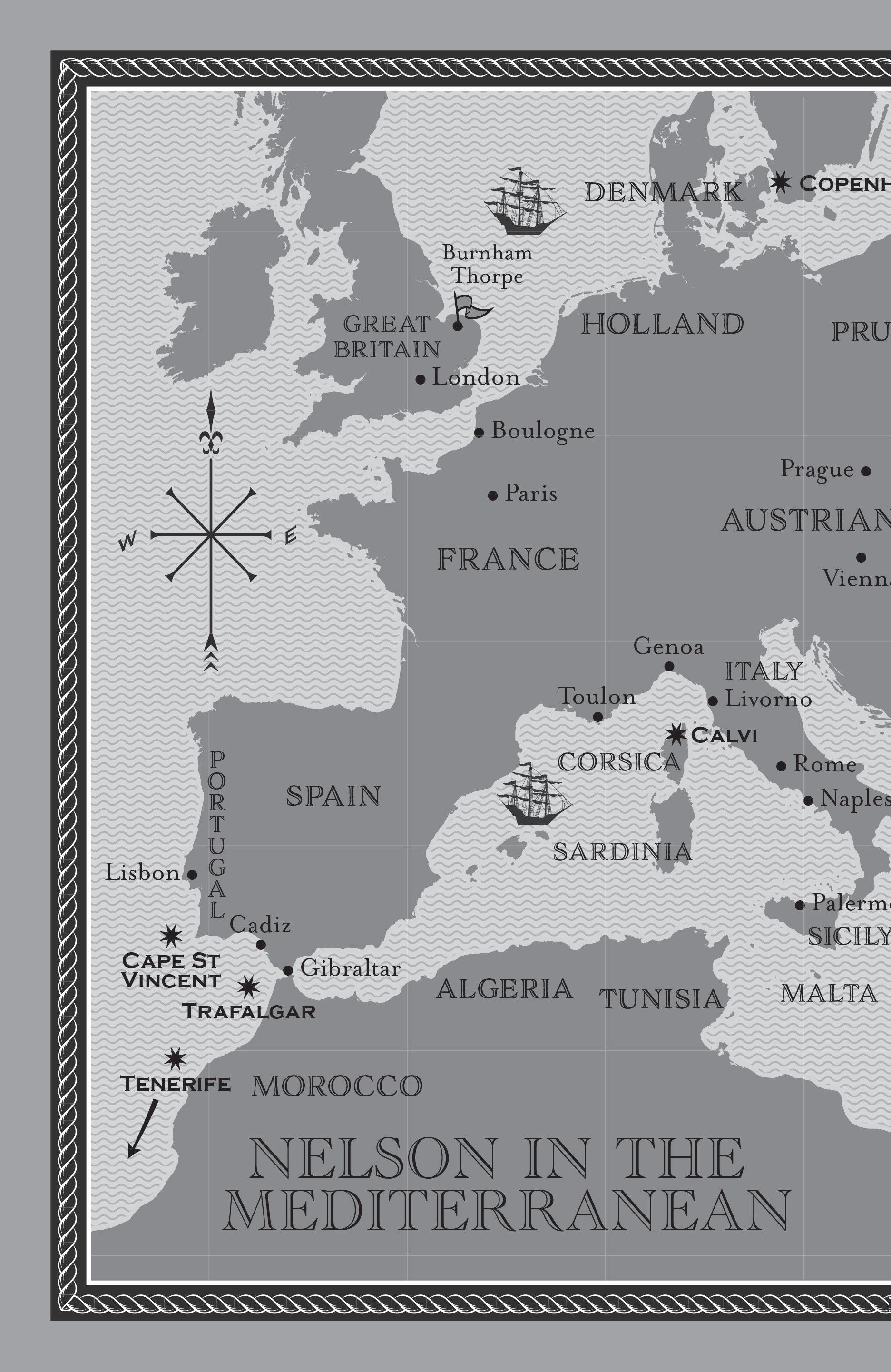
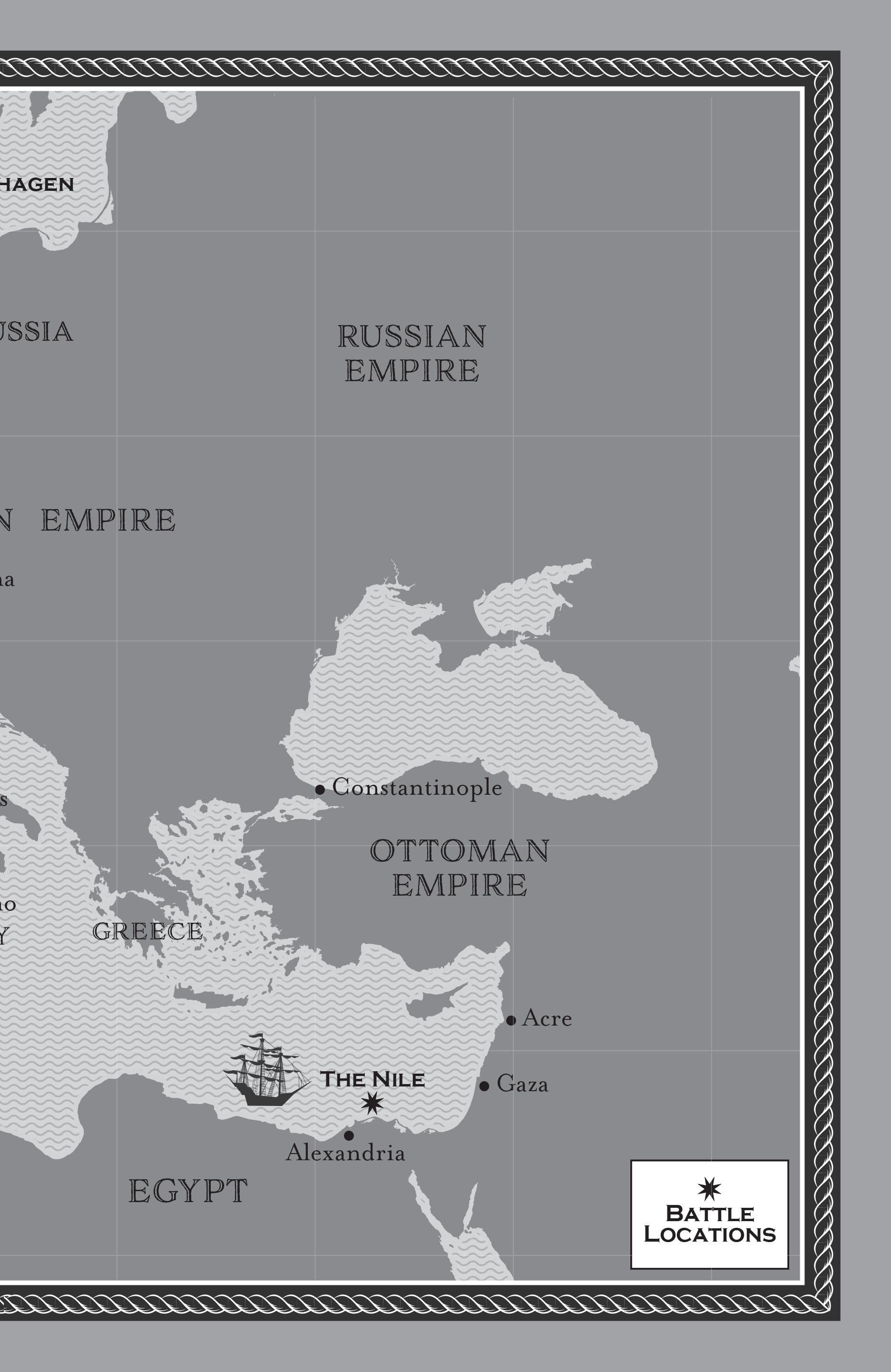
part one the boy who went to sea
Late one afternoon, in the dying days of 1767, a boy stood at the edge of England and stared out to sea.
It was a dreary, dismal December day. Around him, the dull grey marshes stretched as far as he could see. Far above, the seabirds circled silently in the void.
The wind whipped in from the east. The boy shivered, and drew his coat closer around him.
He was slight and pale, perhaps nine years old, with tousled fair hair. Tears glistened in his eyes, but he made no e ort to wipe them away. He just stood there, unmoving, staring at the horizon.
Far away, where the sea met the sky, a small, dark shape moved from left to right. A warship, perhaps, from His Majesty’s Navy? Or just a brig, carrying coal from the northern mines? At this distance it was impossible to tell.
For a long time the boy watched, his face wet with tears, until the ship faded from view. Again he shivered. The thin light was fading; it was getting late.
Then he heard somebody cough. He turned, and saw the sea captain. How long had he been there? He didn’t know.
‘Come on, lad,’ the sea captain said.
As evening drew in, they walked back through the dunes. The sea captain’s hand rested on his nephew’s shoulder. Neither of them spoke a word.
After a while the mudflats gave way to country lanes. They passed farms and mills, barns and cottages. As the last whispers of light dwindled and died, they turned the corner into the village.
There, at the end of the lane, stood a handsome redroofed building of golden stone, smoke rising from the chimney. In the doorway, a stooping, lank- haired man, dressed in a long dark coat and hat, was wringing his hands.
When he saw them, he let out a great sigh of relief. ‘Thank the Lord,’ he said fervently. ‘And thank you Maurice – Captain Suckling, I mean. Thank you!’
Then the Reverend Edmund Nelson bent down to his son. ‘Horatio, my boy,’ he said quietly. ‘I feared for you! Wipe your eyes, and come inside.’
The next day, as flakes of snow drifted from the heavens, they walked to the old stone church to say goodbye to Horatio’s mother.
This time the boy didn’t cry. He stood there in the freezing church, beside his uncle Maurice and his brothers and sisters, as his father read the burial service:
Forasmuch as it hath pleased Almighty God of his great mercy to take unto himself the soul of our dear sister here departed, we therefore commit her body to the ground; earth to earth, ashes to ashes, dust to dust . . .
That night none of them was in the mood for talking. The children sat and watched the flames dancing in the fireplace, while the Reverend Nelson read aloud from his Bible.
It had all been so sudden, Horatio thought. A week before Christmas his mother had taken to her bed, and on Boxing Day she had gone. But when he asked his father how such a thing could happen, the Reverend shook his head and said no man could understand the will of God.
He glanced at his uncle Maurice, who sat by the fire thoughtfully smoking his pipe.
On the captain’s last visit, a couple of years ago, he had told them tales of his voyages at sea. He had talked of his adventures in the Caribbean, and of his battles against their old enemies, the French.
‘The French!’ his mother had muttered, grimly shaking her head.*
That evening Uncle Maurice had taught them songs from his days in the Royal Navy. One particular tune had
* Many years later, Nelson told a friend that he would never have a Frenchman on board his ship, ‘except as a prisoner. I put no confidence in them. Forgive me, but my mother hated the French.’
stuck in Horatio’s mind, celebrating Britain’s victories at sea:
Heart of oak are our ships, jolly tars are our men,
We always are ready: Steady, boys, steady!
We’ll fight and we’ll conquer again and again!
Once, twice, three times the children had chanted the chorus, getting louder every time. Even Horatio’s mother had joined in, laughing to see them so excited.
That night seemed so long ago now, though.
Uncle Maurice left the next morning. On the doorstep he shook hands with the Reverend Nelson. ‘Remember, Edmund, if there’s anything I can do . . .’ he said, and patted him on the shoulder.
Then he raised his hat to the children, mounted his horse and rode o down the road.
For the next few days the snow gathered in deep drifts in the lanes. While the servants bustled about, stoking the fire and preparing hot drinks, Horatio sat by the window, lost in thought.
All his life, the village of Burnham Thorpe, in the county
Horatio and the Captain
of Norfolk, had been home. It was here that he had been born, on 29 September 1758.
Here he had wandered with his older brothers, Maurice and William, exploring the rolling fields and shaded woods, roaming as far as the shingle beaches at the sea’s edge.
The world, the Reverend Nelson told his boys, was changing. More than half a century earlier, England and Scotland had been united in a new country, the Kingdom of Great Britain.
Under King George II , and then his son George III , Britain’s wealth and power had boomed as never before. The Royal Navy had won them new lands abroad, from the rich sugar islands of the Caribbean to the vast forests of North America.
A British trading firm, the East India Company, had carved out control of much of India. British merchants were selling homemade goods, such as wool and muskets, to almost every corner of the globe.
And every year tens of thousands of African slaves were herded onto British ships for the journey west to the American and Caribbean colonies, doomed to spend the rest of their lives on the sugar and cotton plantations.
The Reverend Nelson never told his boys what he thought of the slave trade, which seems so horrifi c to us today. Indeed, only years later, after Horatio had grown up, did some religious groups begin campaigning against it.
In Georgian Britain, everything seemed in motion. There were new devices for weaving and spinning, and up
north men had built great mills and manufactories, where hundreds of people worked at their new machines.
Businessmen had cut deep canals through the fields, allowing them to move their goods more easily. And there was a new network of ‘turnpike’ toll roads, allowing stagecoaches to cross the country at a terrifying speed.
Few of these changes had come to their corner of rural Norfolk, thank goodness. Only three hundred people lived in Burnham Thorpe, most of them farm labourers.
Most were poor, and few could read or write. They loved their local fairs and markets, as well as their evenings at Burnham’s tavern, the Plough. And although they grumbled when times were hard, they always came to the Reverend Nelson’s church on Sundays, and prayed for God to save the King.
As for the Nelsons, they had lived in Norfolk for as long as anybody could remember, a family of farmers and vicars. Even Horatio’s mother, Catherine Suckling, had been a vicar’s daughter.
Nowhere, Horatio thought, could be sleepier than Burnham Thorpe. Here the seasons passed, and life went on, and nothing ever seemed to happen.
Sometimes, when he and his brothers went down to the seashore, he watched the boats coming and going, the sailors unloading their cargoes of salt and barley. He enjoyed listening to their rough accents, and occasionally made out a few words of Dutch or French. Above all, he wondered what they had seen and done, out there beyond the horizon.
Horatio and the Captain
Now, as Horatio looked out at the snow, he thought of his future, in a world without his mother.
His father was a gentle and kind man. An old-fashioned man, a man of God, who always had a penny for the poor.
Horatio shared his father’s faith in God and sense of duty. But he had always known that he was di erent – not just from his father, but from his brothers and sisters.
He didn’t want to stay here in Norfolk. He wanted to sail to the far side of the world, as Uncle Maurice had done, and risk his life for King and Country. He dreamed of adventure; of battle; and, above all, of glory.
One day, he thought fiercely, all the world would know his name.
A few nights later, the Reverend Nelson called Horatio and his brother William into his book-lined study.
Hesitantly, almost apologetically, he cleared his throat. ‘It has fallen to my lot,’ he said mournfully, ‘to take upon me the care and a ection of a double parent.’
Their poor mother’s death, he said, had been a terrible shock, but they must consider the future. His plan was to provide all his children, girls and boys, with a good education, and then to find respectable trades for them. For
hero
seas
instance, he had already found a place for their older brother Maurice in the Excise O ce, which collected taxes for the government.
Horatio shuddered. He couldn’t think of anything worse.
And so, their father said, wringing his hands, he had made up his mind. William was ten now, and Horatio was nine, and . . . and . . .
‘Well,’ he said finally, as if summoning his courage, ‘it is time for you to go away to school.’
School! Horatio could barely believe his ears. This was far, far worse than he had imagined.
His father was still talking. The headmaster of King Edward’s Grammar School in Norwich, Reverend Simmons, had agreed to take them. Since Norwich was thirty miles away, they could stay with their aunt Thomasina, who lived nearby.
Horatio shook his head. Norwich?
His parents had taken him to see the medieval cathedral a couple of years earlier, and he had found the whole place utterly overwhelming. It was one of the largest cities in the country, its streets lined with inns and co ee houses, its roadways crowded with people and horses and coaches and carts.
For a moment he thought of his adventures climbing the trees and exploring the meadows around the rectory. The time he had sneaked out to hunt for birds’ nests; the time he had fallen asleep beneath a hedge; the time he had crept out to spend the night in the woods, and had been caught by Nurse Blackett . . .
Then he thought of his mother, and he felt tears pricking his eyes. But he wouldn’t cry. Not in front of William.
So it was decided. A week later Horatio Nelson took his seat in the draughty schoolroom next to Norwich Cathedral, ignoring the stares of his new classmates and determined not to show a hint of fear.
Day after day he sat there, chewing the end of his quill, listening to Mr Nichols droning on about Latin grammar. Every so often his eyes turned to the window, and he imagined himself out there on the waves, a sailor tossed by a raging storm, the captain of a warship racing into battle . . .
And without fail, Mr Nichols’s reedy voice would break into his dreams – ‘Are you with us, Mr Nelson? . . . MR NELSON !’ – and Horatio would emerge from his daydream to find the schoolmaster bearing down on him, cane in hand.
Life at King Edward’s wasn’t all bad, though. There was the Guild Day feast, when the senior boys rode to dinner in the mayor’s carriage. And there were the ball games at break time, which often ended with Reverend Simmons gazing mournfully at the fragments of a shattered window.
But in the summer holidays, Horatio’s father called his boys into the study again and announced that they would be moving to a better school. Next week they would start boarding at Sir William Paston’s School in North Walsham, a little closer to home.
Once again, Horatio nerved himself for a new start. But as his father led him through the archway towards the
hero
seas
red-brick schoolhouse, he was relieved to see one or two familiar faces from Norwich.
There was William Booty, with his shock of red hair; there was Richard Ellis, his nose buried in a little book; there was Thomas Taylor, scu ing in the dirt . . .
Paston’s was a lot stricter than his last school. The headmaster, ‘Flogger’ Jones, loved nothing more than summoning boys to his table to be beaten with the cane.
Fortunately Horatio’s desk was positioned against the wall, between the parlour door and the chimney, so he often escaped Flogger’s eye. And by now he was getting a reputation for bravery.
On one famous occasion, the boys in his dormitory waited until lights-out before making a rope from their knotted bedsheets and lowering Horatio out of the window, so that he could steal pears from the tree in the garden.
When he climbed back up, breathless but triumphant, his pockets were full of juicy pears. But as the others tucked in, he didn’t take one for himself. He didn’t really like pears, he said. ‘I only took them because the rest of you were afraid!’
When Flogger discovered the theft the next day, he o ered five guineas for the name of the culprit. But nobody said a word. And that afternoon, as Horatio was scrapping in the yard with his friends, some of the older boys came over and shook his hand.
He wasn’t the cleverest in the class, and during old Jemmy Moisson’s French lessons he often fell asleep. But he enjoyed reading, and loved Shakespeare’s plays best of all,
Horatio and the Captain
even though his friends said they couldn’t make head nor tail of them.
Above all, he adored Henry V, the story of the heroic young king who had beaten the French at the Battle of Agincourt. To fight and win for your country, Horatio thought. Could there be a more glorious honour? He learned some of it by heart, and one scene stuck in his mind. Rallying his men before the battle, Henry tells them their courage will be remembered ‘from this day until the ending of the world’:
We few, we happy few, we band of brothers. For he today that sheds his blood with me Shall be my brother.
Whenever Horatio read those lines, it was as if a song were stirring in his heart, and he could feel his blood pumping, and the tears of pride springing to his eyes . . .
In the autumn of 1770 Horatio turned twelve. He looked young for his age: a pale, slender boy, with blue eyes, fairish hair and a thoughtful expression. Christmas that year was dark and miserable. It was one
nelson, hero
of the coldest winters he could remember, and he spent most of his time huddled inside, playing cards with his sisters.
One dull, drizzly Sunday afternoon, after they had trudged back from church, Horatio was idly turning the pages of the Norfolk Chronicle when something caught his eye.
For weeks there had been rumours that France and Spain were plotting war against Britain. One of his classmates said it was something to do with the Falkland Islands, though none of them knew where they were.
Now, as Horatio scanned the paper, a name jumped out at him. War, said the article, was unlikely. But just in case, the Admiralty was sending additional ships to sea, and recalling some of Britain’s most experienced captains to take command.
And there it was, in black and white. ‘Captain Maurice Suckling . . . HMS Raisonable . . . sixty-four guns . . .’
Uncle Maurice!
A moment later he was hammering on his father’s study door, and as the Reverend opened up, sighing wearily, Horatio was already gabbling with excitement:
‘Father, Uncle Maurice is going to sea. Father, please let me go to sea with Uncle Maurice!’
Horatio and the Captain
That evening, as the fire guttered in the hearth, Horatio and his father discussed his future.
The Reverend Nelson loved his children dearly and had thought hard about their next steps. He had always assumed that William would follow him into the Church. And he hoped to find positions for the girls with the local hatmakers.
Horatio, though, had always been a worry. What to do with such a spirited boy?
He was hardly a natural clergyman. A lawyer’s training was so expensive, and buying an army o cer’s position might be even more costly. The Navy, though . . .
True, the Reverend thought, he would have to fork out for Horatio’s uniform, sea chest and kit. But the Navy was a respectable career, in which a boy could go far. And if Maurice could get the boy started, and give him a helping hand in his first few years, who knew where he might end up?
‘Very well,’ the Reverend said. ‘I shall write to Uncle Maurice.’
And as the vicar saw the delight in his son’s eyes, even he began to grin.
Uncle Maurice’s reply came a few days later. He had often thought of taking one of the Nelson boys to sea, he said. But he had always assumed it would be William.
‘What has poor Horatio done, who is so weak, that he above all the rest should be sent to rough it out at sea?’ he wrote. And when the Reverend read out those words at the breakfast table, Horatio’s heart sank like a stone.
‘But let him come,’ his father read on – and at that, Horatio was out of his chair and whooping with excitement. ‘The first time we go into action a cannon ball may knock o his head, and provide for him at once . . .’
But by that point, Horatio was no longer listening.
For the time being, Horatio went back to school. His uncle’s warship, the Raisonable, was still being prepared for sea in the great dockyard down at Chatham, in the south-eastern corner of England.
As the weeks went by, he could barely contain his impatience. But at last, one dreary March morning, he saw his father striding through the archway into the schoolyard, and his heart thumped with excitement.
Two days later, he boarded the stagecoach beside his father, a box with his few belongings tied fast to the roof. As the coach rattled along the potholed roads to London, the Reverend Nelson spent the first couple of hours scribbling notes for his next sermon. But eventually his breathing slowed, and he began, very loudly, to snore.
Horatio was too excited to doze, though. For hours he gazed out at the green patchwork of fields and villages: the deep, damp countryside of England.
Horatio and the Captain
Evening came. The sky darkened, and Horatio, too, felt his eyelids growing heavy. And as his eyes closed, he dreamed of a great fleet out at sea, his country’s flag billowing above the waves . . .
Then, suddenly, he was awake. Sunlight was flooding into the coach, and there was an overpowering smell of drains. The world outside was full of hubbub and commotion: the clink of hammers, the clatter of carts, the ring of church bells . . .
Horatio pressed his face to the glass. For a moment, all he could see was a blur of colour and movement.
Then he began to make out tavern signs and shopfronts, market stalls and soaring spires – and people, so many people! Hundreds and thousands of them, hurrying this way and that . . .
This was it, he thought. The largest city in England, the greatest city in Europe. London!
For Horatio, those first hours in London were a blur of activity. First his father took him to the naval outfitters, who measured him for a blue midshipman’s tailcoat.
Then they ducked down an alley to a shop that sold nautical instruments, its shelves lined with brass compasses and sextants. Finally, consulting a little notebook, the Reverend Nelson led the way down to a dark, cave-like cellar, with an overpowering smell of varnished wood.
After muttering to the shopkeeper, who was so bent and wizened he reminded Horatio of an old goblin, his father pointed to a large wooden box. ‘Your sea chest,’ he said with a smile.
That night they stayed with another of Horatio’s uncles, who lived in a new suburb called Holborn. But Horatio was so excited he barely slept a wink. Tomorrow his adventures would really begin . . .
Next morning, after a rushed breakfast, father and son took to the street again, dragging his sea chest towards the sign of the George and Blue Boar. From here, explained the
The Voyage Begins
Reverend, the stagecoach would take Horatio to Chatham, where he could catch a boat out to the ship.
When they reached the inn, the horses were already being hitched to the stagecoach, ready for departure. Hurriedly they loaded the chest aboard, and then Horatio’s father turned to face him. To the boy’s surprise, the Reverend’s eyes were glistening.
Reaching for his son’s hand, he clasped it in his own. ‘Good luck, my boy,’ he said.
And just for a moment, Horatio wished he could change his mind and come back home to Burnham Thorpe, after all.
But already men were barking orders, and the stablehands were helping him aboard, and the coachman was cracking his whip. Amid the clatter of the wheels, the Reverend was shouting something, but Horatio couldn’t make out what it was.
A moment later the coach turned the corner, and he was gone.
By the time the coach reached Chatham, late on the afternoon of 24 April 1771, it was raining hard. As Horatio boarded the little boat to the Raisonable, he shivered. He was feeling almost sick with nerves, but it was too late now.